N sweet naughty kids summary. Review of N. Sladkov’s fairy tale “Naughty kids. Naughty child - what to do
9 months of waiting, a long-awaited meeting with a little bundle of happiness, a first birthday... Such moments touch every parent! But now the baby has grown a little and you notice with horror that he is not obedient. As a rule, in such a situation, many adults give up, while it is necessary to reconsider some educational positions and understand what is the hidden reason for the child’s impudent behavior.
A disobedient child is a punishment for parents.
Reproaches, advice and moral teachings are rained down on their heads from everywhere. And really, where is the education? Why don't parents pay enough attention to this process? How could they admit that they had a naughty child growing up?
In fact, a child is just a reflection of his parents and their behavior. Simply put, to understand the reason for disobedience, you should pay attention to your own feelings experienced during a conflict with your child.
So, do you often feel irritated when your baby pulls your hand? But this is exactly how he fights for parental attention. Or another case: an often disobedient little child begins to defend his own opinion, refusing to comply with the requests of his parents. At this moment, the latter are most likely overwhelmed with anger. This is how the feelings of parents and children are connected, and if you’re raising a child, then you shouldn’t forget about your own behavior!
Reasons for inappropriate behavior in children.
So the first reason is fight for parental attention.
It is known that kids are very inquisitive, and they also want to be close to their loved ones as often as possible. However, parents are often unable to give the baby as much attention as he requires. The result is a disobedient, offended child who strives to get attention at least in this way.
The second reason - self-affirmation.
How does an adult feel when his mistakes are constantly pointed out and people try to reprimand him? He's starting to get stubborn! Children do the same thing, trying to show their own personality.
The third reason is desire for revenge.
This situation often occurs in a family where the eldest child is growing up, and the youngest has recently been born. Watching how the mother gives all her tenderness to the baby, the elder begins to take revenge. The only thing the baby wants at such moments is for adults to feel the same as he does.
And finally, the last reason - lack of self-confidence.
It should be noted that parents themselves very often push children towards this reason. Do you think that a naughty child does not need praise and encouragement? This is wrong! If parents do not praise their baby, he will simply lose faith in his own abilities and refuse to behave appropriately.
Education should begin from early childhood. No, this does not mean at all that a naughty little child should often serve his punishment in the corner or get hit in the bottom. The main method of education is love. Prohibitions and all kinds of rules can only give rise to stubbornness, which becomes the impetus for disobedience. But do not forget that very often disobedience is a cry from the child himself that he desperately needs boundaries!
Ways to control a child
And now it’s worth paying attention to the ways by which even the most disobedient child can be achieved obedience:
1. Establish rules of behavior
Often parents set prohibitions for their children without explaining them at all. Over time, the baby simply gets lost in the “no” questions. To forget about such a topic as a naughty little child, you need to set some clear rules and justify them!
2. Be firm
If the baby does not obey, he receives a reprimand. Over time, the mother begins to feel sorry for her baby, and she retreats from her opinion. It is not right. Children feel their parents’ doubts very well, so if they say “no”, then they shouldn’t smile and look condescendingly at the guilty little one.
3. We give the child the right to choose
As soon as parents begin to demand absolute obedience from the child, he becomes offended. Who wants to feel like a doll? It is much more useful to offer the child several options for his behavior, no matter how difficult the situation may seem.
4. Praise the baby
A naughty, capricious child is a child who simply lacks parental praise. Don't forget to praise your baby for the smallest things, and he will want to become even better!
5. Create a daily routine
The regime is necessary for children of any age. It is thanks to a well-designed schedule that the child will learn to do what is required of him on time.
Parents' mistakes
The main mistake parents make in raising a child is the frequent use of bribery. Of course, it is much easier to persuade a child to go to kindergarten by promising to buy him a new toy in the evening than to reach an agreement without using bribery. In fact, in order to discern authority in you, the baby must understand that the parent’s word means a lot.
You should also not use physical punishment at the first opportunity or intimidate the child with an “uncle” who will come around the corner and take the little mischief. The child should know that your words and communications are not empty. Moreover, he should not do anything out of fear!
And finally, never show your child your own powerlessness; at the moment of punishment, use the “here and now” rule and think before you act!
And the last thing that parents should remember is the cases in which it is impossible to punish a child, no matter how badly he behaves:
— during meals;
— in front of strangers;
— After sleep;
— during the game;
— at the moment of his desire to help.
Remember, a naughty, capricious child should not become less loved by his parents!
- Type: mp3, text
- Size: 6.68 MB
- Duration: 0:04:52
- Performer: Nikolay Litvinov
- Download the fairy tale for free
- Listen to the story online
Your browser does not support HTML5 audio + video.
Nikolay Sladkov
Naughty kids
The Bear was sitting in a clearing, crumbling a stump. The Hare galloped up and said:
- Troubles, Bear, in the forest. Little ones don't listen to old people. They completely escaped the clutches!
- How so?! - the Bear barked.
- Yes indeed! - answers the Hare. - They rebel, they snap. Everyone strives in their own way. They scatter in all directions.
- Or maybe they... grew up?
- Where are they: bare-bellied, short-tailed, yellow-throated!
- Or maybe let them run?
- Forest mothers are offended. The Hare had seven, but not a single one remained. He shouts: “Where have you gone, you lop-eared ones? The fox will hear you!” And they responded: “And we ourselves have ears!”
“Yeah,” grumbled the Bear. - Well, Hare, let's go and see what's what.
The Bear and the Hare went through the forests, fields and swamps. As soon as they entered the dense forest, they heard:
- I left my grandmother, I left my grandfather...
- What kind of bun showed up? - the Bear barked.
- And I’m not a bun at all! I am a respectable adult Little Squirrel.
- Why then is your tail short? Answer, how old are you?
- Don't be angry, Uncle Bear. I'm not even one year old yet. And it won’t be enough for six months. But you, bears, live sixty years, and we, squirrels, live at most ten. And it turns out that I, six months old, are exactly three years old in your bearish account! Remember, Bear, yourself at three years old. I suppose you also got a streak from the she-bear?
- What's true is true! - growled the Bear. “I remember I was a nanny for a year, and then I ran away.” Yes, to celebrate, I remember, I tore up the hive. Oh, and the bees rode on me then - my sides are itching now!
- Of course, I’m smarter than everyone else. I'm digging a house between the roots!
- What kind of pig is that in the forest? - the Bear roared. - Give me this movie character here!
- I, dear Bear, am not a piglet, I am an almost adult, independent Chipmunk. Don't be rude - I can bite!
- Answer me, Chipmunk, why did you run away from your mother?
- That’s why he ran away, because it’s time! Autumn is just around the corner, it’s time to think about the hole, about winter supplies. So you and the Hare dig a hole for me, fill the pantry with nuts, then I’ll be ready to hug my mother until the snow hits. You, Bear, have no worries in winter: you sleep and suck your paw!
- Even though I don’t suck a paw, it’s true! I have few worries in winter, muttered the Bear. - Let's go further, Hare.
The Bear and the Hare came to the swamp and heard:
- Although small, but brave, he swam across the channel. He settled with his aunt in the swamp.
- Do you hear how he boasts? - whispered the Hare. - He ran away from home and even sings songs!
The bear roared:
- Why did you run away from home, why don’t you live with your mother?
- Don’t growl, Bear, first find out what’s what! I’m my mother’s first-born: I can’t live with her.
- How can you not do that? - the Bear does not calm down. “Mothers’ first-borns are always their first favorites; they worry about them the most!”
- They are shaking, but not all of them! - Little Rat answers. “My mother, the old Water Rat, brought baby rats three times over the summer. There are already two dozen of us. If everyone lives together, there won’t be enough space or food. Whether you like it or not, settle down. That's it, Bear!
The Bear scratched his cheek and looked at the Hare angrily:
- You tore me away, Hare, from a serious matter! I was alarmed in vain. Everything in the forest goes as it should: the old grow old, the young grow. Autumn, slanting, is just around the corner, it’s time for maturation and resettlement. And therefore be it!
 Disobedient child- This is one of the problems that parents most often face in the process of raising a child’s personality. At a certain point, adults begin to notice that their child refuses to obey, does not fulfill the requests or orders of adult relatives, or fulfills them partially. It seems that the children deliberately do things in defiance, and if they carry out instructions, it is under pressure.
Disobedient child- This is one of the problems that parents most often face in the process of raising a child’s personality. At a certain point, adults begin to notice that their child refuses to obey, does not fulfill the requests or orders of adult relatives, or fulfills them partially. It seems that the children deliberately do things in defiance, and if they carry out instructions, it is under pressure.
For a naughty child, the reasons for this behavior may lie in the styles of communicative interaction and models of educational influence used by parents. After all, it is the style of education and communication that shapes the orientation of the child’s personality as a whole and the level of his obedience. Today, first of all, fathers gravitate toward an authoritarian educational model, which represents the active suppression of the child’s volitional sphere. This model of behavior is reminiscent of training, since it does not pursue the goal of explaining to children why they need to perform any actions. This leads to tension in parent-child relationships, which can result in child disobedience.
Children's disobedience is not a tragedy - it is just the need for parents and the rest of their close circle to help the child determine good and bad actions, and also pay attention to their own actions.
Naughty child 2 years old
Until approximately two years of age, the problem of children's disobedience practically does not arise in the adult environment. After all, at this stage the baby interacts with his mother to a greater extent, and also does not yet feel like an independent person. Already after the baby has passed the two-year mark, he begins to take action, which consists of testing the strength of the boundaries of parental patience and prohibitions.
Such actions should not frighten parents. You should also not think that there is something wrong with the child. The baby is just following the path of development.
There are also pleasant moments in children's disobedience. After all, if children do not obey and try to oppose their parents in various ways, this means that a strong personality is growing, capable of showing will and defending their own positions. And if at this stage of children’s formation parents can become authorities for them, then the children will grow up to be self-sufficient and independent individuals. Here you need to understand that gaining authority is not based on intimidating children. Gaining authority in front of children is based on understanding and partner communication. The child can be forced to do what the parents demand. However, without understanding why such actions are necessary, children will perform them exclusively in the presence of their parents, and in their absence, they will do as they please.
According to most experts, it is at the age of two that a personality begins to form, and already at the age of three the child has a full-fledged “I”. As a result, it is quite important not to overlook the critical moment, otherwise, it will be incredibly difficult to correct the flaws in upbringing later.
How to raise a disobedient child, what to do when he throws up, in order to achieve the immediate fulfillment of all his “wants”. One of the methods to get out of a difficult situation caused by a child's hysteria is the method of distracting the baby. To this end, you can interest him in something while maintaining complete calm. Parental behavior at the first hysteria caused by a child should be as follows: a calm response and perseverance. You shouldn't follow the lead. If hysterics are repeated, there will be much less tears and screams, because the baby remembers that the first time the adults did not make concessions to him. Repeated hysteria is a kind of test to see whether he really cannot influence his parents using this method. Therefore, in cases of repeated hysterics, it is so important to behave in a balanced manner and not succumb to childish provocations and tricks.
Parents need to understand that their children are, in a sense, like chameleons. Since in similar situations, but in the presence of different adults, children will behave differently. You can often find a family in which the kids argue with their mother, but their father’s orders are carried out unquestioningly and the first time.
Thus, adults should understand that childish disobedience, which manifests itself at the age of two, may just be an attempt to test the firmness of parents or to test the boundaries of what is allowed. Therefore, parental behavior must be consistent, harmonious (that is, all adults taking part in the educational moment must follow a single strategy) and resistant to children's tantrums.
Naughty child 3 years old
Child development occurs in leaps and bounds. The first leap occurs when the child is three years old and marks the beginning of the crisis stage, which consists of restructuring relationships with the adult environment and with the real world. This period is quite difficult for kids. After all, they grow, therefore, they change and become uncontrollable. A characteristic feature of the crisis stage is children's negativism, which represents children's disagreement with their parents. In other words, kids add the particle “not” to any suggestions or parental requests. If parents begin to notice that the word “no” is increasingly slipping into the child’s conversation when asked to a common request, then this is the first criterion for the appearance of a three-year crisis. So, for example, a baby loves to walk outside, but when his mother invites him to go for a walk, he answers “no” or the mother calls him to eat, but he refuses, although he is hungry. This behavior indicates negativism, that is, the emergence of.
Typically, this period can last approximately 3-4 months with competent parental behavior, after which the baby becomes more manageable. If at this stage the parent puts pressure on the child, denying his will and desire for independence, then negativism can become his characteristic feature in adult life.
Children's disobedience during periods of crisis must be perceived as the development of a small personality. Manifestations of disobedience should be accepted with joy, because this indicates that the little man is growing and developing. However, this does not mean that adults should follow childish whims and submit to any demands of their own children. It is necessary to let the kids understand that adults hear and understand them, but at the moment they cannot fulfill the requirements.
The reasons for a naughty child may lie in lack of attention, struggle for power, manifestation of character.
The reason for the disobedience of a 3-year-old child is a lack of parental attention. Childish disobedience in this case may be a behavioral strategy in order to attract the attention of the parent. After all, negative attention from parents is better for children than no attention at all.
Competition for power with the adult environment is also a common factor provoking the emergence of children's disobedience. A 3-year-old child begins to figure out who dominates family relationships. In this case, disobedience is expressed in the form of open disobedience. A naughty child is not at a crisis stage; he simply wants everything to happen exactly the way he wants. Such disobedience must be nipped in the bud. After all, the baby will only develop normally when he knows that the main parent is the main one in the family. Such disobedience calls for the definition of clear limits of what is permitted in the family.
According to the above, parents need to try to understand that a capricious, disobedient child is not a tragedy, but just one of the stages of formation that absolutely all kids go through.
Naughty child 4 years old
Children's disobedience, in most cases, serves as a basis for parents and other adults around them to think about what could be the reason for such behavior or what the baby wanted to say in this way. So, why is the child naughty, what prompts the baby to behave in this manner?
At the age of four, children have usually already successfully overcome the first crisis period of three years. Parents seem to be able to breathe easy, but again their child begins to show disobedience. Parents cannot understand what is happening and why the child does not obey?
The reason for children's disobedience at the age of four may simply be a lack of attention. In this way the baby strives to show that he needs his parents, that he misses them.
Another typical reason for children's disobedience can be an unsuccessful example, which can be either a real child who achieves his goals with such behavior, or a cartoon character whom the child sympathizes with.
A disobedient 4-year-old child requires patience and high perseverance from the adult environment. Often children stage so-called “concerts” in public to get the desired result. After all, they understand that even if one parent scolds them for such behavior, the other will find a reason to protect him. Therefore, in order to correct children's disobedience, it is very important that parents adhere to consistency in the educational strategy and comply with uniform requirements. In other words, either the entire adult environment of the child praises him for a certain action, or, conversely, scolds him.
Children, especially at such a young age, need praise. Therefore, do not spare kind words towards your own child. However, it is necessary to take into account that excessive praise can lead to a completely opposite result, as a result of which the person who grows up is not a self-sufficient person, but an egocentric one with an inflated sense of self-esteem. Therefore, the baby should be praised not for his appearance or toys, but for actual good deeds. The more the adult environment praises the baby for his good deeds, the more he will try. And if any disagreements arise regarding educational issues between parents, they should be discussed so that the baby does not hear.
How to raise a disobedient 4-year-old child? Raising naughty children involves following basic rules. The most important rule is the prohibition on indulging in all children's “wants”. In other words, you should not submit to the child’s unjustified and capricious demands, otherwise, this mechanism for fulfilling his desires will be deposited in his head, as a result of which in the future it will be much more difficult to overcome such behavior in him. Yelling should also not be used as an educational measure. Since this is useless and can only provoke crying or increased hysteria.
It is not recommended to discuss children's behavior among adults in the presence of the person responsible for such discussion. A four-year-old child needs to be explained the required rules of behavior, while the tone of the conversation must remain calm.
Naughty child 6 years old
Why is a child naughty at the age of six? Because he is approaching the onset of another crisis stage. Children begin to try to regulate their own behavior in accordance with the rules. Previously flexible, they suddenly begin to make various kinds of claims for special treatment of their own person, attention to themselves. Their behavior becomes pretentious. In children, on the one hand, a certain demonstrative naivety appears in their behavior, which irritates the adult environment due to the fact that they intuitively perceive it as insincere. On the other hand, the child seems too mature, since he imposes his own standards on adults.
For children, integrity falls apart. Therefore, this stage is characterized by the presence of exaggerated forms of behavior. The child cannot control his own feelings (does not control emotional manifestations, does not know how to restrain them). After all, the previous forms of behavior have already been lost to him, and new ones have not yet been acquired by the baby.
The basic need of this stage is respect. Any child reveals claims to respect for his own person, to be treated like an adult, to recognition of his own sovereignty. If such a need is not satisfied, it is impossible to build a relationship with this person based on understanding. Children are open to understanding only if they are respected.
At the age of six, children begin to learn to satisfy their own physical and spiritual needs in ways that are acceptable to them and their environment. Difficulties in learning new ideas and norms of behavior can provoke the emergence of unjustified self-restraints and excesses. E. Erikson argued that children at this stage are striving to quickly discover such behavioral forms that will help them include their own desires and interests within socially acceptable boundaries. He formulated the essence of confrontation with the formula “initiative in spite of guilt.”
Encouraging children's independence contributes to the formation of their intellectual sphere and initiative. In cases where manifestations of children's independence are constantly accompanied by bad luck or children are subjected to unnecessarily severe punishments for any offenses, a predominance of feelings of guilt may appear over the desire for independence and responsibility.
A capricious, disobedient child at 6 years old may appear due to a discrepancy between the parental attitude and the desires and potential of the children. That is why parents should think about the validity of all prohibitions and the need to give their child a little more freedom to express his independence.
It is also advisable to change your own attitude towards the child. After all, he is no longer the little baby he was before. Therefore, you need to be careful about his judgments and positions.
How to deal with a disobedient 6-year-old child? A commanding tone at the age of six and moralizing are ineffective, so it is necessary to try not to force the child, but to influence him with convictions, reason and analyze with him the possible consequences of his actions.
Often, ordinary humor in communication and optimism help to improve parent-child relationships.
Naughty child - what to do
Raising disobedient children, first of all, should be aimed at identifying the reason that provoked disobedience. Since the strategy of educational influence depends on the reasons that caused disobedience.
The most common reason explaining why a baby suddenly stopped obeying his parents is an age crisis. Children go from birth to adolescence through three age-related crises, the result of each of which is the appearance of a neoplasm. For example, three-year-old children for the first time strive to separate themselves from their mother and consider themselves an independent person; they also begin to use personal pronouns in relation to themselves for the first time.
Starting from the age of six, children experience a crisis of connection between a preschooler and a schoolchild. This stage is characterized by children getting used to a new routine, gaining a certain amount of independence along with responsibility, which causes changes in behavioral reactions that parents perceive as disobedience. Therefore, if disobedience arose precisely during periods of crisis, then parents are advised to be patient and try to be gentle with their children. In most cases, children's disobedience, provoked by a crisis, disappears without a trace after the end of the crisis period.
How to raise a disobedient child if his disobedience is caused by a lack of parental attention? In this case, the adult environment needs to try to spend more time with the child, show interest in activities, participate in joint games and simply spend leisure time with the family. After all, the birth of a baby, in addition to joy, should be accompanied by an understanding of one’s own responsibility for the upbringing and formation of a full-fledged self-sufficient personality. And for this, the child, in addition to feeding and the minimum necessary care, needs to be given enough attention, otherwise it will be almost impossible to cope with the negative consequences of one’s own inattention.
Often parents do not realize that they forbid their children too much. If any action of the baby is accompanied by constant parental “you can’t”, “not this”, “don’t go”, then resistance becomes a completely natural response. As a result, parents should realize that total control is not the optimal way to form a harmoniously developed and independent personality.
The manifestation of constant external control at the age of six will lead to the development of a dependent, irresponsible, easily dependent personality that is incapable of making serious decisions.
Naughty child - what to do? Parents must remember when raising their children that their goal is to form a physically developed, harmonious and independent personality, and not to live their lives for them. The most important task of adults in raising small individuals lies in giving them the desired direction of development, transmitting basic values, and timely stepping aside to provide children with the opportunity to gain their own experience.
A parent must rely in educational moments, first of all, on wisdom and justice, on love and care, and then peace and harmony will reign in family relationships!
The Bear was sitting in a clearing, crumbling a stump. The Hare galloped up and said:
- Troubles, Bear, in the forest. Little ones don't listen to old people. They completely escaped the clutches!
- How so?! - the Bear barked.
- Yes indeed! - answers the Hare. - They rebel, they snap. Everyone strives in their own way. They scatter in all directions.
- Or maybe they... grew up?
- Where are they: bare-bellied, short-tailed, yellow-mouthed!
- Or maybe let them run?
- Forest mothers are offended. The Hare had seven - not a single one remained. He shouts: “Where have you gone, you lop-eared ones, the fox will hear you!” And they responded: “And we ourselves have ears!”
“Yeah,” grumbled the Bear. - Well, Hare, let's go and see what's what.
The Bear and the Hare went through the forests, fields and swamps. As soon as they entered the dense forest, they heard:
- I left my grandmother, I left my grandfather...
- What kind of bun showed up? - the Bear barked.
- And I’m not a bun at all! I am a respectable adult Little Squirrel.
- Why then is your tail short? Answer, how old are you?
- Don't be angry, Uncle Bear. I'm not even one year old yet. And it won’t be enough for six months. But you, bears, live sixty years, and we, squirrels, live at most ten. And it turns out that I, six months old, are exactly three years old in your bearish account! Remember, Bear, yourself at three years old. I suppose you also got a streak from the she-bear?
- What's true is true! - growled the Bear. - For another year, I remember, I went to nurse-nannies, and then I ran away. Yes, to celebrate, I remember, I tore up the hive. Oh, and the bees rode on me then - my sides are itching now!
The Bear and the Hare walked further. They went out to the edge and heard:
- Of course, I’m smarter than everyone else. I'm digging a house between the roots!
- What kind of pig is this in the forest? - the Bear roared. - Give me this movie character here!
- I, dear Bear, am not a piglet, I am an almost adult, independent Chipmunk. Don't be rude - I can bite!
- Answer me, Chipmunk, why did you run away from your mother?
- That’s why he ran away, because it’s time! Autumn is just around the corner, it’s time to think about the hole, about winter supplies. So you and the Hare dig a hole for me, fill the pantry with nuts, then I’ll be ready to hug my mother until the snow hits. You, Bear, have no worries in winter: you sleep and suck your paw!
- Even though I don’t suck a paw, it’s true! I have few worries in winter, muttered the Bear. - Let's go further, Hare.
The Bear and the Hare came to the swamp and heard:
- Although small, but brave, he swam across the channel. He settled with his aunt in the swamp.
- Do you hear how he boasts? - whispered the Hare. - He ran away from home and even sings songs!
The bear roared:
- Why did you run away from home, why don’t you live with your mother?
- Don’t growl, Bear, first find out what’s what! I’m my mother’s first-born: I can’t live with her.
- How can you not do that? - the Bear does not calm down. - Mothers’ first-borns are always their first favorites; they worry about them the most!
- They're shaking, but not all of them! - Little Rat answers. - My mother, the old Water Rat, brought baby rats three times over the summer. There are already two dozen of us. If everyone lives together, there will not be enough space or food. Whether you like it or not, settle down. That's it, Bear!
The Bear scratched his cheek and looked at the Hare angrily:
- You tore me away, Hare, from a serious matter! I was alarmed in vain. Everything in the forest goes as it should: the old grow old, the young grow. Autumn, slanting, is just around the corner, it’s time for maturation and resettlement. And therefore be it!
Add a fairy tale to Facebook, VKontakte, Odnoklassniki, My World, Twitter or Bookmarks






